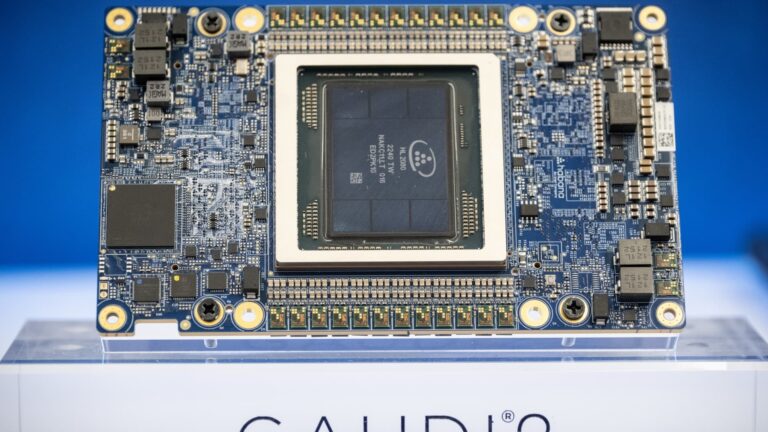The corporation is throwing down its hat in the hopes of taking a slice of an industry that is expanding quickly.
A few days ago, Intel hosted a major event to showcase its newest CPUs for data centers and consumers. Called “AI Everywhere,” the event featured the official introduction of Meteor Lake and its 5th Generation Xeon CPUs. At the conclusion of the presentation, CEO Pat Gelsinger made a “one more thing” move by revealing the never-before-seen Gaudi3 accelerator, which is scheduled for release in 2024 and will compete with rival products from AMD and Nvidia. Up until now, Intel has not been a part of the AI accelerator discussion, but with Gaudi3, it hopes to change that in the near future.
With Gaudi3 and the newer 5th and 6th Gen Xeons, Intel hopes to significantly ramp up AI performance, which it described as “competitive” in November when it released some MLPerf results for its current 4th Gen Xeon CPUs and its Gaudi2 accelerator. Gelsinger said little about the upcoming accelerator, other than to say that it is “out of the fab, into the lab” and “powered-on and looking healthy.”
The next-generation Gaudi3 accelerator, according to Wccftech, will be built on TSMC’s 5nm process, which is the same as that used in the production of Nvidia’s H100 and AMD’s MI300 GPUs (though Nvidia is using a refined version called 4nm). It will also reportedly offer 1.5x higher performance than Gaudi2, twice the compute, and 50% more memory, meaning that it will switch from HBM2e, which has 96GB, to HBM3 or HBM3e, the latter of which is the fastest stacked memory currently on the market.
Intel claims it is rapidly expanding its Gaudi pipeline thanks to “growing and proven performance advantages combined with highly competitive TCO and pricing.” Gaudi3, with its advanced manufacturing process and addition of the newest memory standards, could be very competitive with Nvidia’s and AMD’s products while costing less.
Due to soaring demand, the AI industry is reportedly already experiencing shortages of Nvidia GPUs, with companies such as Lenovo unable to meet their current order volume. AMD recently announced its MI300 accelerators, so it is unknown how those will affect Nvidia’s hegemony.

